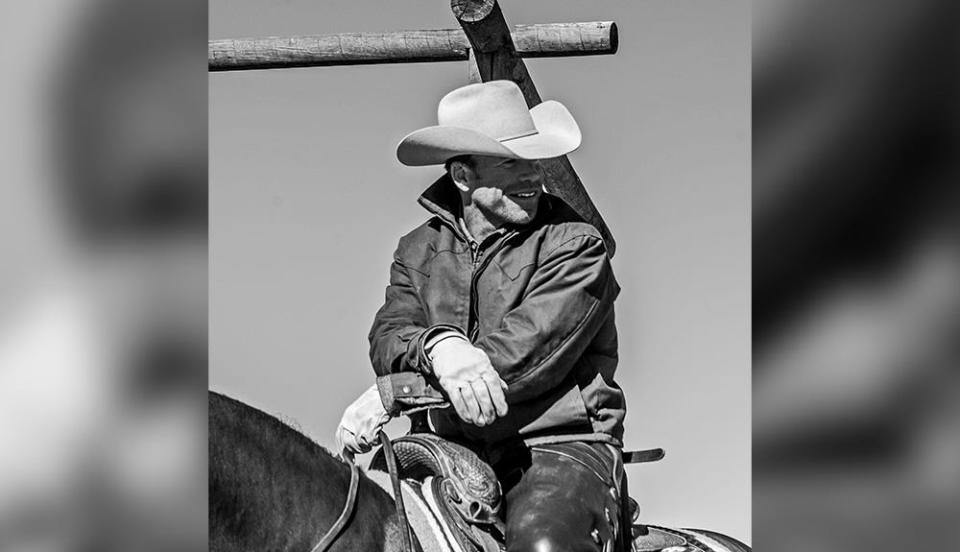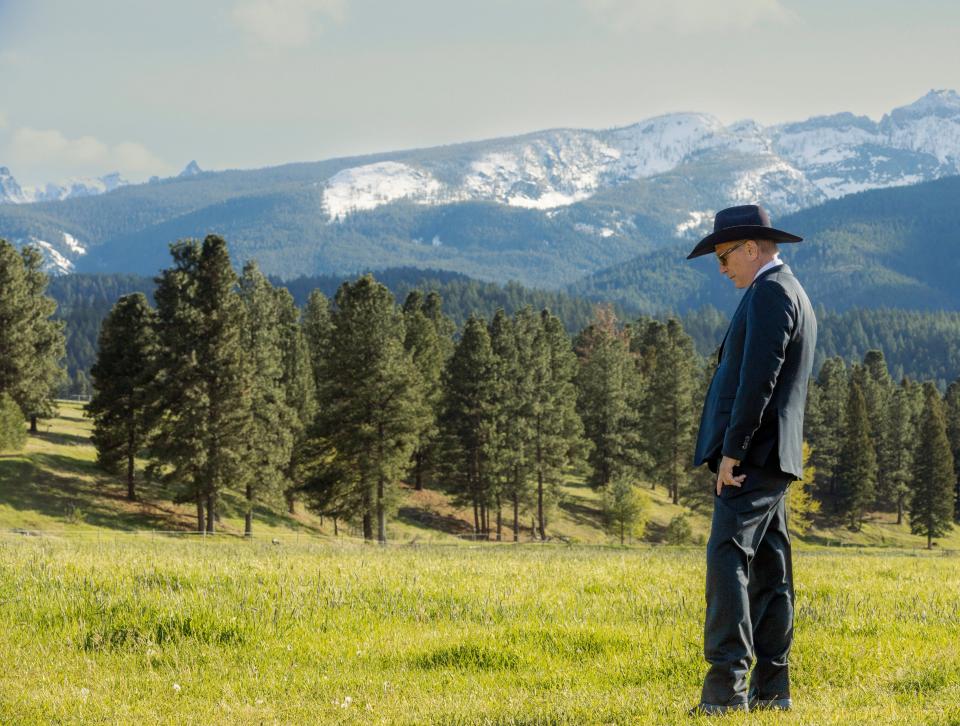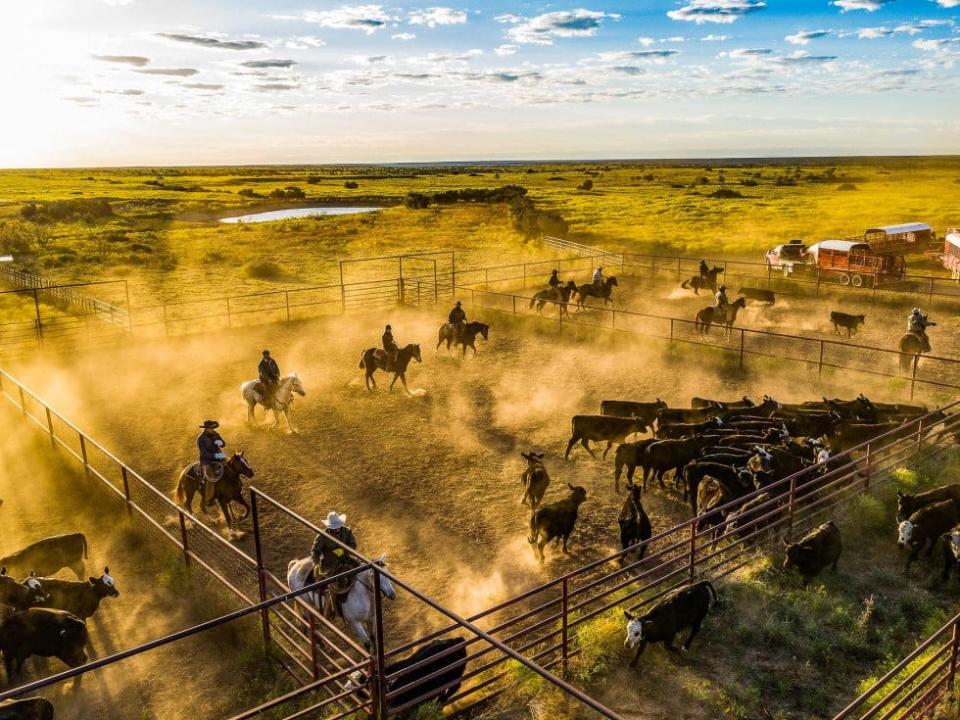Romanticizing the West: 'Yellowstone' director talks 6666 Ranch heritage, future projects
- Oops!Something went wrong.Please try again later.
"Yellowstone.""1923.""1883.""Tulsa King."
These are just a few of the most recent TV shows screenwriter, actor and director Taylor Sheridan has worked on, helping connect today's audience to the Wild West.
Reinventing the way Westerns are portrayed in Hollywood, Taylor, through his art of storytelling, has been able to create a new movement of "romanticizing Westerns."

"What does romanticizing mean? It means loving the place and that's it," he said recently in Lubbock. "Doesn't mean to justify everything that took place there. It just means loving it, for better or for worse."
His unique affinity to Westerns and showing the audience the rawness and beauty of working the land has prompted Sheridan to be the most prominent modern-day storyteller of the Wild West.
Sheridan, an Academy Award-nominated screenwriter, led off the 17th season of Texas Tech's Presidential Lecture & Performance Series with a speaking engagement last week at Buddy Holly Hall.
He talked about his storytelling process, telling the audience that he strives to make his stories believable by basing them on real life and, in part, drawing from his own life experience.
A storyteller in the making
Growing up in Bosqueville, Texas, Sheridan was immediately influenced by ranching.
His family had a passion for ranching through many generations, and continuing with that way of life grew to be his mother's dream.
"My father's dream was not," Sheridan said. "He's from Waco, and he became a doctor, and so he wanted to live in the city."
He said this "constant battle" between his mother and father would ultimately lead the family to lose their ranch.
Sheridan said during this time he was also fascinated by Western TV shows, especially when he was in the 7th grade.
"Warner Brothers had a channel they put out and they just started to run old westerns," he said. "So I watched some of these westerns and they play the same 12. So you see them 8 or 10 or 15 times and I started studying cameras."

He would take what he was learning about cameras and the placements and movements and start viewing ranches through those lenses, questioning how it would look from certain angles.
After the family lost the ranch, it was time for Sheridan to start thinking about his future. He said he felt lost. He didn't know what to study or do, so he went to Austin.
"I got a job in Austin, doing landscaping to build the rock fences, rock walls, which was in fashion at that time," he said. "We would go to the shopping mall for lunch because air conditioning and get a burger. And some modeling scout come up to me and said 'Hey, do you want to go to Chicago and be a model' and I said I cannot."
He asked if the scout's company did anything with movies and as luck would have it, they did. Showing his interest, the scout gave Sheridan a plane ticket to Chicago, but rather than hoping on the flight, he cashed in the ticket.
However, he took stock of his life up until that point and asked himself, "what do I have to lose?"
After landing a role on the hit TV show "Sons of Anarchy," Sheridan said he quickly realized that he didn't like not having control over the script of his character.
Taylor Sheridan redefining modern Western TV shows through "Yellowstone"
Sheridan said the reason he is successful in writing hit western shows is because he sticks to what he knows — ranch life.
"You need to know more about it than most anyone who watches and or at least as much and then you have to write for the experts," he said. "If you're making a western, you want the cowboys to watch it and go yeah, this is how you do it."
If a TV show can educate, entertain, and enlighten the audience about a specific topic, Sheridan said then he is able to create a purely fictitious world that is believable to the audience.
Whenever focusing on a project, he said there is no plot — "it's all a whirlwind character and circumstances." So instead, he focuses on developing the characters.
Sheridan said he doesn't sit down and write out each character in a traditional sense. Using one of his better-known characters, "Beth Dutton" from "Yellowstone," he said he created her to be the person everyone wishes they could be.

"I came up with Beth, you know, you go to a restaurant or the mall, or you go somewhere in somebody's rude to you, and they say something really rude to you, and as you're driving away, you think it's a perfect thing to say, but you would never say that. Beth says that," he said.
Sheridan said he fell on a touchstone character when creating Beth and wrote to that to help people connect with the character even more so.
"She's a character who fears creating great tragedy in her life and she is determined to never be scared again. And with that comes a great liberation," he said.
Sheridan says he not only thinks about the human characters but also the location.
"The human characters reacting to or interacting with (it)." he said. "You could argue '1883' was the antagonist in the Wild West. It's the character that John Dutton serves in 'Yellowstone.' It's everything because our landscape is what defines us."
Wanting to have the production feel as authentic as it can be, he said he advocated to have the production shoot on the location of where the story is situated. Which led him back to Texas — West Texas.
Owning a piece of West Texas — 6666 Ranch
After seeing a CNN clip hailing the Yellowstone Ranch and the most famous ranch in America, Sheridan said he wanted a real challenge.
He said with "Yellowstone," his process was like coating a pill with sugar to help city folks appreciate where their food comes from and help them realize ranch life is something worth protecting.
Ready to tell the nitty gritty story of ranching, his eyes turned to the 6666 Ranch.
"You go down in South Texas, you stand in the Shadow King, but you know where I'm from standing in the showdown of the four 6s," he said. "Those are the best horses. Those are the best cowboys."
Travelling to Guthrie, Sheridan met with the ranch manager, who had some reservations about Hollywood telling the story of the ranch. After alleviating his worries, the manager and president of the ranch said they had to receive final permission from the owner — Anne Windfohr Marion.
She agreed; however, she passed away before Sheridan got there and the will was read.
"The instructions were to sell it - break it up and sell it," he said of the ranch. "For whatever reason, she thought that was the best thing for the ranch. She instructed the president of the ranch to try and find somebody who would maintain the values that she instilled in it, her mother and her grandfather and great-grandfather had, but if she couldn't within a certain period of time, it needed to be sold."
Realizing that this was perhaps a last chance to have access to one of the last remaining legacy ranches in America, Sheridan asked how much it was.
The price tag: $359 million. He was about $338 million shy of being able to buy it.
Feeling that this was his life's purpose, he started looking for ways to raise the cash. He believed God was about to make things come full circle for both him and the ranch.
So he went to Paramount Studio and struck a deal that brought about "1923", "1883" and many other productions and made him "extremely rich for 22 days."
After speaking with his family, he became the newest steward of the 6666 ranch.
Prior to buying the iconic ranch, Sheridan had already bought a small ranch in Weatherford. After buying the 6666s, he went through a closet and found maps of Guthrie.
As it would turn out, Marion was a visionary and bought the Weatherford ranch knowing it would become the horse capital of the world. However, she ultimately sold it and it would end up in Sheridan's possession.
Reflecting on the legacy he wishes to leave, Sheridan said he hopes in 100 years, "They talked about the storied ranch that's run the same way it was just it was started 253 years ago by this town Ranger who also made some movies."
This article originally appeared on Lubbock Avalanche-Journal: Yellowstone director Sheridan talks 6666 Ranch, modern westerns

